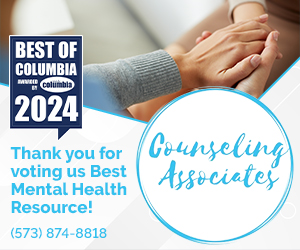With the holidays approaching, it’s normal to experience a combination of excitement and apprehension toward seeing loved ones. Unresolved challenges with family members are an unfortunate but common aspect of our lives. Conflict and the difficult conversations that follow it can be natural obstacles in any relationship, whether it be with a partner, family member, friend or even a neighbor.
Those conflicts can range widely from “Should my partner and I buy this new car for our family?” to “Your dog’s barking wakes me up every morning,” to “I think it’s time to move mom and dad out of the house.”
“When you start a hard conversation, you will want to be able to say why you’d like to talk,” Ashley Angerer-Blunt says. Angerer-Blunt is a licensed mental health provider and director of Outpatient Services at Burrell Behavioral Health. She says respect for the other person(s) and avoiding kneejerk reactions are massive pieces of forming healthy relationships and managing conflict.
“When you initiate, start by asking if it’s a good time to talk and explain why you want to have this particular conversation,” Angerer-Blunt says. “Notice their body language or when their answers become short and what makes them expand further.”
Angerer-Blunt’s best advice is to listen, ask questions and learn. Approach the conversation with an objective to understand the other person(s) rather than a goal to win a battle. She advises not to make the conversations transactional, but to make them empathetic.
Angerer-Blunt says it’s easy to recall times when we were in a conversation with someone who was out to win and did not understand where you were coming from. A more loving approach can help prevent a disagreement from evolving into an out-of-control escalation. You’re having this conversation because you’re committed to making this relationship better or moving an issue forward,” Angerer-Blunt says.
Angerer-Blunt says an example of empathetically engaging is asking to hear more about a topic or stance you don’t share.
“Say something like, ‘I don’t have that perspective, so please tell me why you feel or think this way,'” Angerer-Blunt says. “Listen to their perspective. Thank them for sharing. And then, share why you feel the way you do.”
Prepare for a difficult conversation not to win, but to stick with the goal of compromise. Angerer-Blunt says we often strategize how to win and do not think about empathy and hearing the other person out. Preparation should be geared to help us emotionally regulate while looking for the best solution possible for all parties.
Avoid generalizations and the impulse to ascribe beliefs to the other person. Be mindful of your emotions, as they may change throughout the conversation. It’s okay to take breaks. Maintaining respect and a calm center is helpful not only to you but also to your conversation partner’s emotions.
It’s also helpful to acknowledge any preexisting tension within a relationship. Tension isn’t wrong or necessarily bad, but it can be a barrier to resolution. Family conversations can be especially difficult, given existing dynamics combined with the dueling desires to feel part of a greater whole and be an individual sharing a perspective.
An example is when older children have difficult discussions with their aging parents. In this situation, the child is most concerned about safety in their loved one’s environment, and the older adult is most concerned about their independence. By approaching the conversation calmly and empathetically, each party can better grasp the other’s viewpoints and get to a place where true feelings can be shared.
“Radical acceptance can be helpful in some conflicts,” Angerer-Blunt says. “Validating that maybe we don’t like these facts, but these are the facts, and we are going to work together to figure out our situation, which can be greatly helpful.”
What Happens After the Conversation Ends
It can be hard to know how to end a difficult conversation. Sometimes, we want to keep talking, but it’s clear that our conversation partner is ready for the end. Notice body language, such as eyes darting around the room. Ending a conversation is sometimes a temporary end, so parties can take a break and continue talking later when emotions have calmed.
“It’s understandable to want the hard thing to be over after the conversation is over, but that is not a reality for most hard topics,” Angerer-Blunt says. “Depending on how deep the topic is, it’s possible that the conversation will need to be had a few times.”
It’s important to realize that emotions may not go as we pictured in a challenging conversation. Having difficult discussions is a practice and skill that takes most people time to build — with plenty of mistakes along the way.
“Most of us aren’t given a playbook growing up on how to have hard conversations about anything. We’re often shown the opposite,” Angerer-Blunt says. “Things may not go well, things could get worse, but the only way to improve communication, understanding and ultimately our relationships is to have the conversation.”
Working with a mental health professional can help everyone involved in conflict navigate the situation better. Therapy can help us develop and hone our conversation skills, ultimately leading to healthier and more fulfilling connections to the people we care most about.
What to Ask Yourself Before a Difficult Conversation
Take a minute for yourself and reflect on these questions to prepare for a productive conversation.
- Do I feel in myself and present to engage in this conversation fully?
- What is the purpose or goal of this conversation?
- What is the ideal outcome for both of us?
- What are my wants and needs?
- What am I feeling about this situation as a whole?
- What part of the conflict or issue am I responsible for?
- Is there anything from my past being triggered by the current issue? If so, what?
- What assumptions do I have about the other person’s intentions or perspective?
- What might they be thinking and feeling?
- Am I okay if the conflict is not resolved today?
- Is there anything from my past that is being triggered by the current issue?
- How do I feel about having this conversation?
- How might the other person be feeling?
Phrases to End a Difficult Conversation
- I’d like to take a break and come back to this in a couple of hours after we’ve both had time to think.
- Thank you for sharing your perspective.
- I am going to take some time to think.
- Can we revisit this later?
- I need to take a break and talk about this when I’ve calmed down.
- I need to cool off before going further in this conversation because I respect you and want to be here to talk.
- Thank you for sharing everything with me today. I appreciate you. Do you feel okay ending the conversation here and picking up later?
- I know you have a lot going on, so I’ll let you go. Thank you for talking to me.
To find more resources, visit burrellcenter.com, follow Burrell Behavior Health on social media or reach out to another local mental health resource.



















